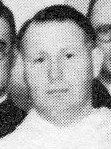Georges-Henri Lévesque facts for kids
Quick facts for kids
Georges-Henri Lévesque
|
|
|---|---|

Georges-Henri Lévesque (1938)
|
|
| Born | February 16, 1903 Roberval, Quebec, Canada
|
| Died | January 15, 2000 (aged 96) Quebec City, Quebec, Canada
|
| Occupation | Priest and sociologist |
| Known for | Founder of National University of Rwanda |
Georges-Henri Lévesque was an important Canadian figure. He was a Dominican priest and a sociologist. He lived from February 16, 1903, to January 15, 2000. Lévesque was known for his modern ideas during a time when Quebec was very traditional. He played a big role in changing society in Quebec.
Contents
Georges-Henri Lévesque's Life and Work
Early Life and Education
Georges-Henri Lévesque was born in Roberval, Quebec. His parents were Georges Lévesque and Laura Richard. He became a priest in 1928. He studied philosophy and theology in Ottawa. He also studied social sciences in France.
Teaching and Leadership
Lévesque taught at the Université de Montréal from 1935 to 1938. Then, he became a professor at Université Laval from 1936 to 1962.
In 1938, he started the School of Social, Political and Economic Sciences at Laval University. He was its first director until 1943. This school became the Faculty of Social Sciences in 1943. Lévesque was its first dean, leading it until 1955.
Helping Society and Education
Lévesque founded the Quebec Superior Council of Cooperation. He was its first president from 1939 to 1944. He also started a magazine called Ensemble! and was its director.
He was part of important Canadian groups. He served on the Royal Commission on National Development in the Arts, Letters and Sciences. He was also vice-president of the Canada Council for the Arts. He represented Canada at many international events.
In 1963, Lévesque helped create the National University of Rwanda. He was its first president until 1971.
Impact on Quebec Society
Lévesque strongly supported the co-operative movement. This movement helps people work together for shared benefits. Through his work at the university, he helped create new social support groups. He also helped modernize older social welfare groups.
His Faculty of Social Science trained many people who became union organizers. Unions help workers get fair treatment. Lévesque's modern ideas often clashed with the government of Premier Maurice Duplessis. Duplessis led Quebec in a very traditional way. Lévesque is seen as one of the key figures who helped start the Quiet Revolution. This was a time of big changes in Quebec society after Duplessis passed away.
In 1955, the Prime Minister wanted Lévesque to join the Senate of Canada. This is a part of Canada's Parliament. Lévesque agreed, but the appointment did not happen.
Awards and Recognition
Georges-Henri Lévesque received many honours for his work:
- In 1983, he received the Pearson Medal of Peace. This award is given for work in peacekeeping.
- He was made an Officer of the Order of Canada in 1967. He became a Companion in 1979. This is one of Canada's highest honours.
- In 1985, he was made an Officer of the National Order of Quebec.
- He received honorary doctorates from fourteen different universities.
- A sculpted bust of him was placed at Laval University in 2002.
 | Claudette Colvin |
 | Myrlie Evers-Williams |
 | Alberta Odell Jones |

